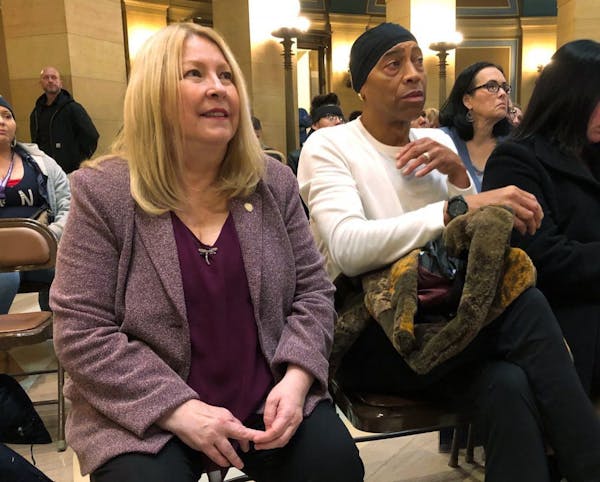After working into the early morning hours Wednesday, Gov. Tim Walz and Republican lawmakers talked late into the evening in hopes of closing a deal on a two-year state budget expected to top $45 billion.
The round-the-clock discussions spanned all of Wednesday, breaking only for lunch and dinner. Earlier in the day, as he brushed past the assembled media, Walz pointed to the Diet Mountain Dew in his hand — his signature beverage — and said he was on his third of the day before stepping into a conference room to continue negotiating.
Walz, alongside fellow Democrats in the Minnesota House, opened final negotiations earlier this month with Senate Majority Leader Paul Gazelka, R-Nisswa, with the two sides at odds over major differences on taxes and spending. They have until May 20 to craft a state budget for the next two years before the Legislature must adjourn for the year as required by the state Constitution.
In the midst of a Wednesday evening break, Walz dropped by an annual law enforcement memorial ceremony near the Capitol, where he gave brief remarks that nodded to the occasional "chaos" that can transpire up the hill.
"Shame on us if we can't figure out a way to work with one another," Walz told the group of state and local law enforcement, their relatives and a smattering of lawmakers.
Walz, House DFL leaders and Gazelka resumed talks after 9 p.m. on Wednesday and continued late into the night. They did not plan to update reporters after 11 p.m.
Wednesday's discussions mirrored the conditions, at least publicly, of the previous day's talks, which extended until 2:30 a.m. Wednesday before both sides resumed later that morning. The long hours and relative silence stand in contrast to negotiating sessions Sunday and Monday, which were brief and ended with scorching statements with each side casting blame on the other.
Walz and DFL lawmakers want more money for schools, health care and transportation.
Republicans who control the state Senate have held firm that they will not agree to any tax increase and want the current 2% tax on health care to expire at the end of the year as scheduled. Gazelka has been resolute in his opposition to tax increases, suggesting that an additional $100 million in spending offered by the GOP to boost schools and public safety funding could come instead from the budget surplus and reserves.
That came in response to Walz and DFL leaders offering to cut spending and dropping their proposed gas tax hike from 20 to 16 cents per gallon.
The health care industry — including doctors in white coats — were a major presence around the State Capitol on Wednesday.
They were lobbying to keep the 2% health care tax in place, even though they and their patients are the ones who pay it.
Many health care interest groups, including hospitals, want to continue paying the tax because the money goes to health care programs for people who would otherwise be without insurance.
It raises about $700 million per year.
J. Patrick Coolican • 651-925-5042
Stephen Montemayor • 612-673-1755
Former DFL Senate Majority Leader Kari Dziedzic dies of cancer at age 62

How the Star Tribune is covering the 2024 election

Fact check: Walz and Vance made questionable claims during only VP debate

In Tim Walz's home city, opposing groups watch him debate on the national stage

